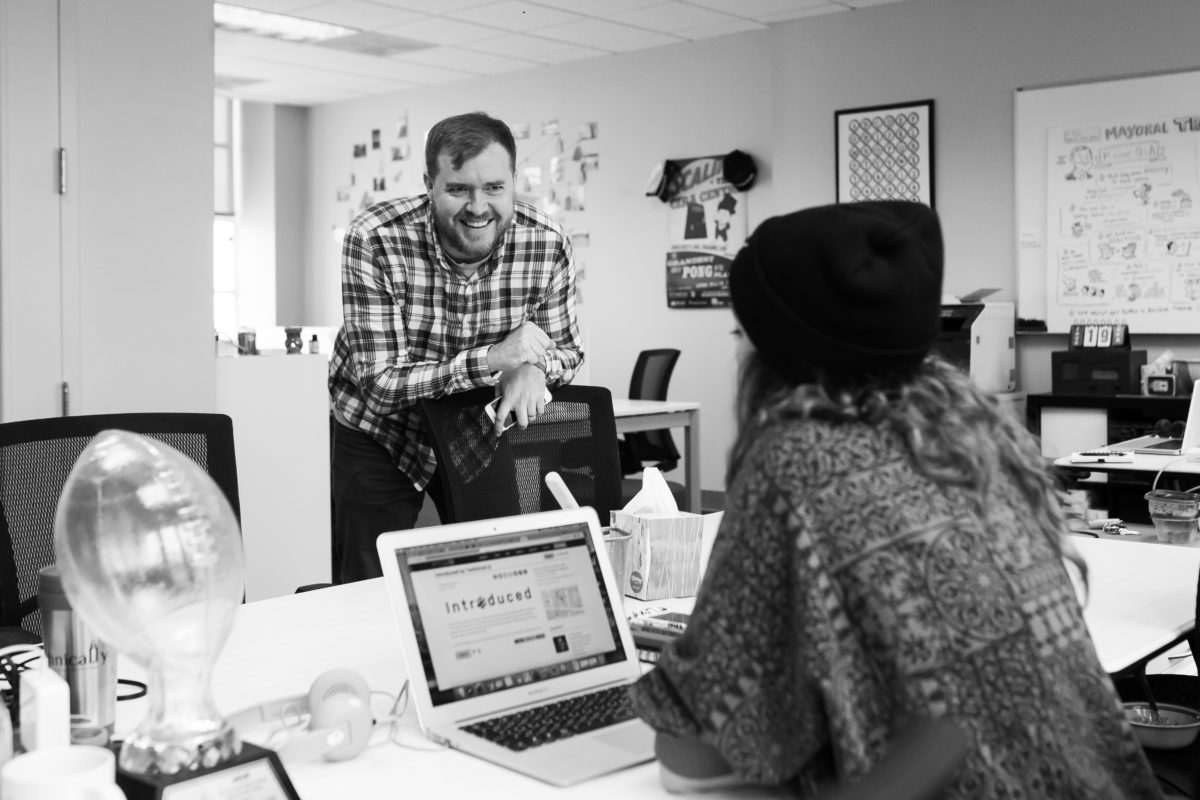Written by Technically Media CEO Chris Wink, Technical.ly’s Culture Builder newsletter features tips on growing powerful teams and dynamic workplaces. Below is the latest edition we published. Sign up to get the next one.
In 2012, after a round of phone interviews, I met Technical.ly’s first remote employee in the pretty garden of a coffee shop in Baltimore’s Mount Vernon neighborhood. The other three of us who comprised our fledgling local tech news organization used a small two-room office in Center City Philadelphia.
Our vision was then, as it remains today, to grow and serve a community of technologists and entrepreneurs with journalism about how local economies change to help advance their careers and companies.
Over the next 10 years, Technically Media mixed two strategies for location: We used coworking spaces to house teammates we employed in each community we reported on (because we demanded we have reporters in each community), and we also maintained a central headquarters for other staff. After several smaller offices, in fall 2015 we moved into the top floor of a historic publishing house.
We maintained a hybrid staff because we wanted to both honor each community we served and invest in a single company culture. We gave it our best, and I believe we did an admirable job. A decade later, though, we’ve given up our physical office and are becoming a fully distributed company. We made a choice, and your company needs to, too.
Let me tell you why this is the right decision for us now — and why I still believe physical offices will remain important for others.
As this pandemic recedes into a painful seasonal nuisance, remote work will have grown considerably but it won’t yet be the most of what American professionals do.
In 2019, 5% of American workdays were done at home. Post-pandemic, that number is expected to quadruple to 20%. That’s a remarkable increase in such a short time, but it will still be far from the nearly two-thirds of Americans who were working full-time from home at the pandemic’s remote work peak.
The draw of the office is well-documented. Though a massive shift in remote work did boost productivity, it devastated our sense of belonging. Humans are just better at connecting with each other in person. One CIO told me she bets the majority of big companies will always find physical offices cost effective — and most Americans work at big companies.
The flexibility of asynchronous work for our working parents, digital nomads and focused introverts was too alluring. Our team wanted the space to work.
The prevailing wisdom at present is that the office’s usage will simply change. Call on-sites the new off-sites. Earlier this year, we were planning to do the same — add a recording booth, get a better coffee machine, rearrange the furniture for more collaborative space — and those changes just might make the most sense for your team, or even ours again someday.
Not now. In a survey of our team earlier this year, two-thirds said they’d prefer to be in the office one day a week or less. In 2019, a quarter of our staff worked remotely, in different cities; they just couldn’t have the same experience as those teammates who came into our headquarters. As a small team of 20, that kind of difference didn’t make sense. The pandemic made this obvious point even more obvious. Like all of us, we experimented with new ideas for making remote work successful — and routinely remembered that we already were a largely distributed team.
We made our longstanding monthly all-team call more interactive, and we added a Monday morning all-team standup. We offer a monthly IT budget to cover home office expenses, and we design cross-departmental internal hackathons. Now, each of our teammates will get the same experience, and we can focus on improving that.
In that survey of our staff earlier this year, there was the option to list as a preference to never come into the office. Not a single teammate chose that. In a followup section, the prevailing feedback was that in lieu of a daily office commute, we should host quarterly all-team activities and other occasional in-person coworking days. Otherwise, the flexibility of asynchronous work for our working parents, digital nomads and focused introverts was too alluring. Our team wanted the space to work.
Becoming a remote-only company feels important for how we serve our readers, too. We grow and serve a community of professionals that we bring together from tech ecosystems around the country, and increasingly the world. Orientating around a single physical headquarters doesn’t align with that work. In contrast, many of the clients we serve, many of whom proudly and deservedly boast their hometown credentials, feel stronger because of the time together that an office can make easier.
Back in 2012, I still remember our first remote employee asking how often we’d bring him “up to the mothership.” No matter how much we tried to reflect anywhere we reported, having an HQ orientated us in that place. Technical.ly should focus on the people we serve, wherever they are. This allows us to do that better.
Whether you choose a constellation of smaller offices or a grander headquarters or to go entirely remote, there is no one right solution. The wreckage of this pandemic will give us more flexibility. If we take it.
Sign up for the Culture Builder newsletterJoin the conversation!
Find news, events, jobs and people who share your interests on Technical.ly's open community Slack

Delaware daily roundup: Over 4,000 Black-owned businesses uncovered; Dover makes rising cities list; a push for online sports betting

Delaware daily roundup: Ladybug Fest illuminates small biz; Hahnemann Hospital's biotech future; intl. politics and a Middletown project

Philly daily roundup: Jason Bannon leaves Ben Franklin; $26M for narcolepsy treatment; Philly Tech Calendar turns one


